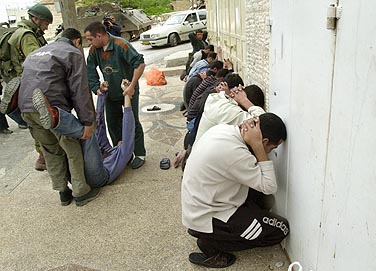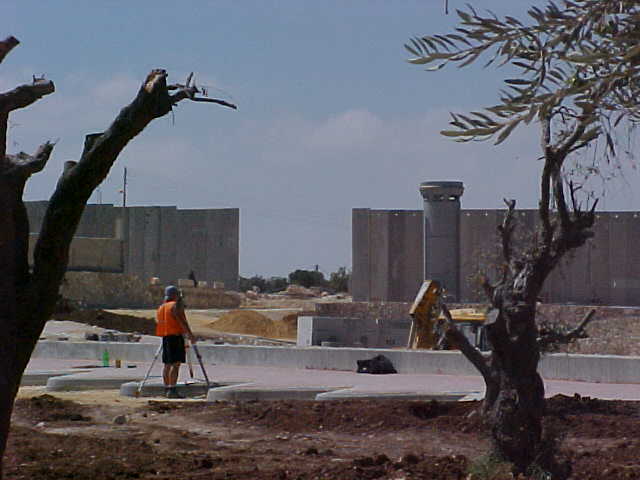I find traveling in the area of Israel proper, also referred to as 1948 Israel to distinguish it from the occupied territories of 1967, a terribly challenging experience. I’m sitting now in a fancy room at a fancy hotel a dozen floors up with a stunning view of a sea that most Palestinians are forbidden from even dreaming about. Occupation is not simply checkpoints, walls, and incursions, psychological warfare is alive and well. And when dreams are all you have, they will go after those too, though it doesn’t mean they will succeed in stopping them or you. Sixty years on and people still dream of their sea and their great grandfathers’ houses.
It’s not only that I can access Palestinians’ heritage—literally, for one of the many indigenous lines of genealogy Palestinians claim is the Philistine people who were a people from the sea and who made their livelihoods of and by the sea—but that I can bathe under a high pressure shower head in this beautiful room and never think twice about the millions of Palestinians who don’t have water to shower or cook or even drink today. Two days ago we were at Dheishah Refugee Camp in Bethlehem. The water tanks were empty, and Dheishah is not at all unique in this dilemma. This is occupation. We are stuffed at this hotel on what the Sheraton proudly calls “Israeli” foods, and in these foods I recognize the remnants of Palestine—the Palestinians animals Israeli soldiers and settlers slaughter for fun, the vegetables the Israeli government denies Palestines the water to grow and the permission to harvest, and the language, dishes, and heritage stolen and appropriated. Should I stop here with my critique? It’s enough for me to think on water and food and the sea. But I couldn’t stop there, so I asked the manager how many Palestinians are working here. He burst out rather too loudly, “I should hope none!” I responded, “That is too bad and very racist.” We talked a few minutes longer. I boldly claimed that I live in Ramallah, and he brazenly informed me that what I see there is not the reality of the situation. And I have to admit, I agree.
The reality of the situation is far worse than what I see in Ramallah. The reality is what I see in Qalqilya. Here is the worst, where an entire city is surrounded by walls and electric fences and has only two points of access, both heavily controlled by Israeli soldiers with all-too-young fingers on all-too-quickly-pulled triggers. In my time here I’ve had dozens of M-16s trained on me; how many times has a single Palestinian looked at the barrel of the gun? I’ve seen a young Palestinian boy of maybe 12 slapped around with full force by stupid 18 year old Israelis in uniforms that symbolize, to me, the worst of humanity.
The worst of reality is in Jayyus where an entire village is cut off from its olive orchards—its life sustenance—on top of which the people are all denied the Israeli military permits to tend and harvest that staple fruit. Instead, the military compensates them with the gift of sight; they can stare through the lens of an apartheid structure—a complex of ditches, fence, barbwire, a patrol road, security cameras and watch towers—at their dying trees and confiscated land. The worst of reality is in Jenin where once lush and famous fields of vegetation are dry and dusty because all the water is stolen and the people are told they must buy back that stolen water but have not the money to drink it themselves. So how can they think of watering their fields? The worst is in the Bedouin camps where a nomadic people live in a cycle of demolition and reconstruction, a cat and mouse game with the Israeli military who wants them gone. But they have no where to go and so they rebuild their shacks from the piles upon piles of debris the Catepillar bulldozers leave behind. The worst of the reality is in Gaza. We read enough to know of Gaza’s incomprehensible suffering. We read and we acknowledge, and I am no different in this. Then I sit in my beautiful room with my beautiful view and I think about one question over and over again: “How can we think this is justified in any way?” A few say it’s not, but by and large, Israel truly believes it is, and the world nods in support.
But a glimmer of hope to end: Palestinians still exist. They struggle, god knows, but they are here and alive. And whether Israelis are brave enough to acknowledge the other or not, the Palestinians are here. And some Israelis are fighting a lifetime of indoctrination to take on the call of the brave. How sad that this should be such a hard task, but alas, America and Americans have done no better. A final thought: I met a 16 year old Israeli Jewish girl yesterday, and she had a message for you and all Americans. She begged you not to believe what you have been told, to recognize that every story has two sides and those two sides have many faces and the faces have shades. Dare to complicate your understanding of the world, of conflicts in it, and of this one in particular. And in that complicated, confused state, imagine that we can make this world better and that you have a responsibility in doing that. And I told her I agree completed and invited her to visit me in the occupied territories. She will come, though from one hour drive away it will be far more difficult for her to do so than it will be for you to come from half way across the world. The boundaries we build and the ones our governments graciously build to protect us from the other are so very high and so very difficult to break down. But this girl inspired me because she is tearing them down with all her strength. She offers a promise of peace, and will all the Palestinian promises I’ve seen, I might just hold on to hope!
Subscribe to:
Post Comments (Atom)








No comments:
Post a Comment